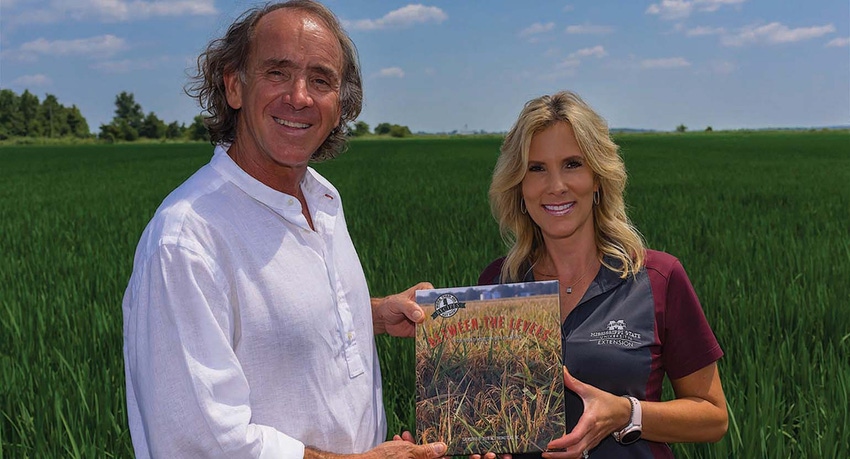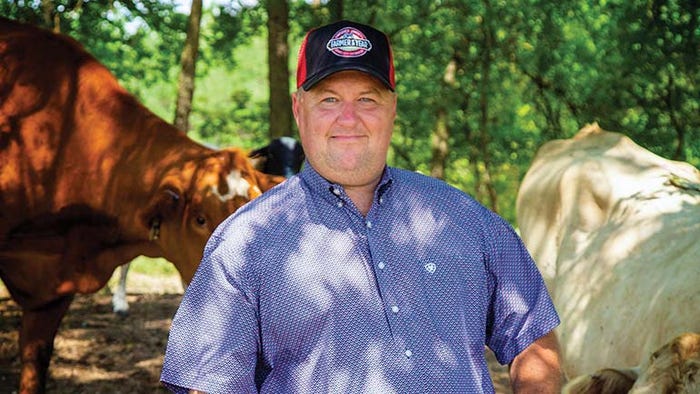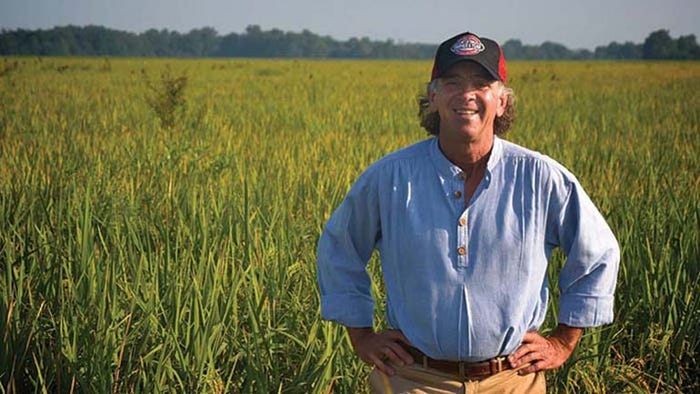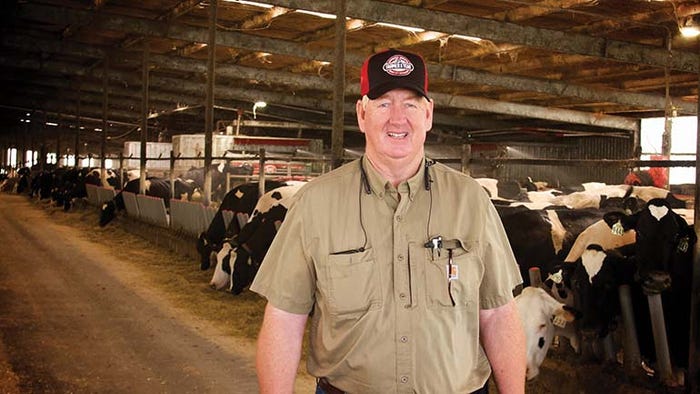November 8, 2022

Three farmers from Delta region states were honored as state farmers of the year at the 2022 Sunbelt Expo held in Moultrie, Ga., in mid-October. The awards were sponsored by Swisher. Here is a look at the three successful farmers and their operations.
Chris Sweat
Arkansas Farmer of the Year
Chris Sweat, a fourth-generation farmer who grew up on a full-time poultry and cow/calf operation, attended Southern Arkansas University where he received a BS degree in Agriculture Education in 1997 and a Master’s degree in Agriculture in 2009. He met his wife, Denise, who also grew up on a farm, at a 4-H livestock event. She graduated from Southern Arkansas University as well with a BS in Agriculture Business in 2000. Knowing they wanted to raise their family on a farm, they started with 27 acres in Montgomery County.
 Chris Sweat, 2022 Arkansas Farmer of the Year. (Sunbelt Ag Expo)
Chris Sweat, 2022 Arkansas Farmer of the Year. (Sunbelt Ag Expo)
In 2003, they bought their first 80 acres in Hempstead County and harvested some timber to start working on the foundation piece to their farm where their home, built in 2007, is now located. He and his family have built that up to a total of 1110 acres currently operated, with 780 acres rented and 330 acres owned.
On the livestock side, he owns 120 head of commercial cows/calves; 60 head of registered seed stock (Simmental/Simbrah); 20 to 30 head of recipient cows for embryo transfer; and runs 50 to 100 head of hair sheep seasonally.
“In 2015 we started breeding our registered Simmental cows with registered Simbrah bulls to produce Simbrah cattle,” Sweat said. “The Simbrah cattle have slightly more “ear,” and are more tolerable in the heat and are extremely marketable in the Texas show cattle market.”
Sweat is a co-owner and founder of the Sheep and Goat Buying Station in Hope, Ark. The buying station was established in 2009 with a close family friend, Jesse Duckett.
Stacey R. Stone, University of Arkansas Division of Agriculture Research & Extension Agent, nominated Sweat.
“I remember Chris from the days when we were ag teachers competing in the same contests,” Stone said. “He’s always been an innovator, especially with his work on the Sheep and Goat Station. He also started a new pen sale show at the state fair where he’s volunteered many hours and served as the beef superintendent over the years.”
Stone added, “Chris is a really sharp guy who has the gift of figuring out ways to do things with minimal effort that result in maximum results. We’ve done different projects together, including trapping feral hogs on his farm and soil testing that improved his fertilizing techniques. Chris’s wife Denise has also been of immense help and support in all their agricultural undertakings.”
Michael L. Wagner
Mississippi Farmer of the Year 2022
Located in the rich, highly organic, blue gumbo clay soil or ‘terroir’ of the Mississippi Delta is Two Brooks Farm, owned by Michael L. Wagner. His family can count an unbroken line of 10 generations of farmers back to 1742. Their prodigious, consistent labor has produced a whopping 281 consecutive harvests of rice and other crops.
 2022 Michael L. Wagner, Mississippi Farmer of the Year. (Sunbelt Ag Expo)
2022 Michael L. Wagner, Mississippi Farmer of the Year. (Sunbelt Ag Expo)
“While ours is primarily a rice farm, we also grow non-GMO soybeans and manage several acres of woodlands, lakes, bayou, and river frontage for the benefit of wildlife and plants growing there,” Wagner said. “Our main goal is to strike a balance between the long-term needs of a healthy natural habitat and the daily caloric needs of consumers. It’s ingrained in me and my two children, Lawrence and Abbey, to work with and through nature to produce the highest quality food for those who rely on us.”
Two Brooks Farm has seven full-time and three part-time employees. It has grown from 400 acres from its inception to 3,100 acres currently operated, with 1,700 acres of rice yielding 140 bushels/acre and 100 acres of soybeans yielding 60 bushels/acre. Part of the rice is marketed through normal channels such as Farmer’s Grain marketing pool and direct sales. The Rice Company buys a large amount as well. Through Two Brooks Rice, Wagner markets his on-farm milled rice directly to consumers, to food services, and through second party channels for national distributions. The farm reserves about 80,000 pounds of milled rice for food banks annually.
The finely textured, predominately clay soil of the Delta is rich in nutrients that lend themselves to the flavor of Two Brooks Farm rice. The terroir’s physical properties and structure resist degradation, leaching, wind erosion, and depletion of the nutrients required by rice. Products from Two Brooks Farm fall into the general sizes (short, medium, and long-grain) and categories of white, brown, jasmine, basmati, red, and black rice, along with a number of varieties of rice grits and rice flour.
“We like to offer the public a wide array of products in terms of taste and nutritional value,” Wagner said.
Recycling water on the rich, composted, perfectly flat continuous rice land reduces the need for aquifer water and the energy to pump it. Some years it requires no additional irrigation, being rain fed. Farm-emitted water is at least as clean as it was when it entered the fields, especially free of silt and fertilizer. This is accomplished through the filtering action of a connected labyrinth of continuous (up to five or six) rice fields.
Laura Jane Giaccaglia, Bolivar Extension Coordinator/Agent IV, nominated Wagner.
“Mike has a unique farming operation, and I have gotten to know him through our Mississippi rice promoting activities in conjunction with the Delta Rice Promotions Board,” she said. “I value his knowledge, experience, expertise, and, most of all, his friendship. Mike will be the first one to tell you that his main focus is the quality, not quantity, of his product. It’s what distinguishes his operation from others. He is a steward of the earth and works to bring awareness to the public of building ecological systems and promoting sustainability and healthy agricultural environments. His ecologically raised rice is a story worthy of sharing with everyone, especially the next generations of farmers.”
John M. Harrison
Tennessee Farmer of the Year
Philadelphia, Tenn., home of Sweetwater Valley Farm, was settled as part of a Revolutionary War land grant in the early 1800s. At the turn of the 20th century, it became a dairy farm, with the original barn built in 1917. Seventy years later, John and Celia Harrison purchased interest in the farm and became the sole owners in 1992.
 John M. Harrison, 2022 Tennessee Farmer of the Year. (Sunbelt Ag Expo)
John M. Harrison, 2022 Tennessee Farmer of the Year. (Sunbelt Ag Expo)
In 1984, Harrison undertook his first dairy operation, renting a 350-acre farm with equipment and buying 80 cows. In 1998, Harrison made the decision to produce cheese at the dairy by using milk from his cows, known as farmstead cheese. Throughout the early 2000s, both the herd of dairy cows and the cheese operation have expanded. In 2018, Sweetwater Valley Farm became Tennessee’s first Lely LX Dairy Farm, milking 500 cows with robotic technology. It continues to be a diversified farming operation with both dairy and beef cows, as well as a source of crop production. There’s a total of 4,490 acres under operation, with 1,200 rented and 3,290 owned.
Sweetwater Valley Farm yields are: 1,200 acres of corn silage yielding 20 tons/acre; 600 double cropped acres of barley silage yielding 8 tons/acre; 200 acres of corn yielding 200 bushels/acre; 400 acres of soybeans yielding 55 bushels/acre; and 1,600 acres of hay and pasture yielding 2.5 tons/acre for hay. It’s also home to 2,050 mature dairy cows; 1,500 replacement heifers; 650 beef cows; and 450 beef calves.
Harrison’s corn grain is used as dairy feed; any excess corn is stored on the farm and sold to local feed mills. The soybeans are roasted for feed at AgCentral Co-op. Currently Harrison is installing an on-farm roaster to reduce future feed costs. Beef calves are grouped and marketed at graded feeder calf sales.
“In 2021, over 44 million pounds of milk was marketed through Dairy Farmers of America and transported to Mayfield Dairy Farm’s plant in Athens, Tenn. Sweetwater Valley Farm annually purchases back 10 percent of the raw milk (approximately 4 million pounds of milk) for cheese production.”
David Bilderback, University of Tennessee Extension Agent, nominated Harrison.
“Over the last couple of decades, the dairy industry has faced enormous challenges,” Bilderback said. “What’s remarkable about John is that he has managed to thrive as a dairy farmer, innovate and diversify in terms of crops and products, and even expand his operation, all the while doing great advocate work for agriculture in our area. He was one of the first on board for a UT extension dairy benchmarking program. John has weathered some tough times by making good, courageous decisions.”
You May Also Like




